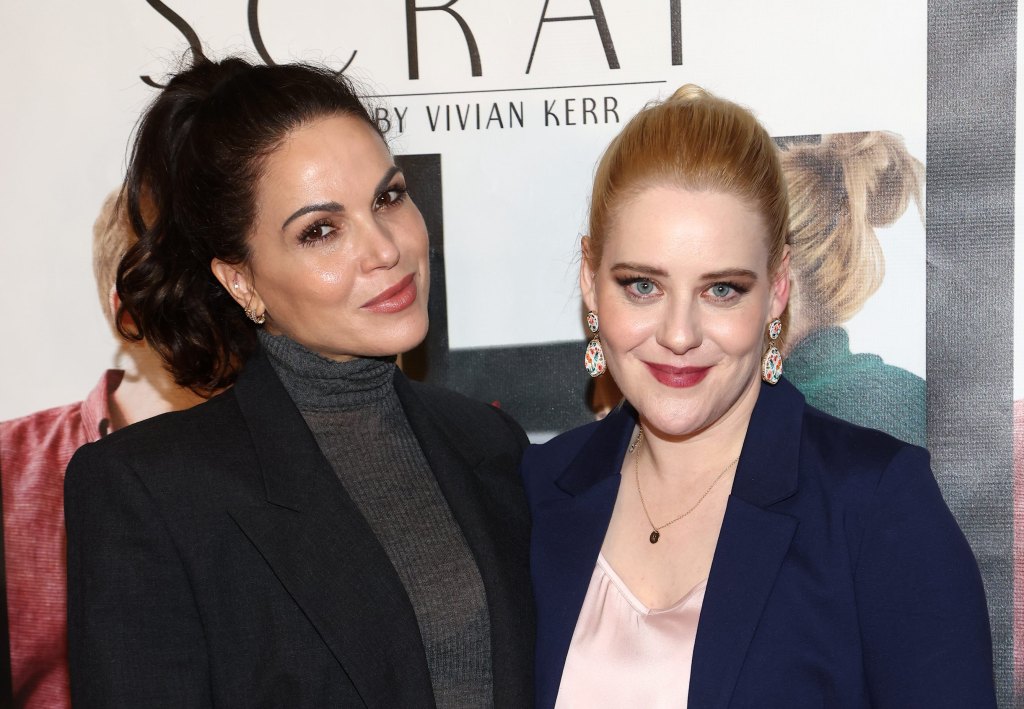The recently released indie film, Scrap, explores very prevalent topics in society including IVF, homelessness, which is a substantial issue at present due to the catastrophic fires in Los Angeles, and complicated relationships. The profound film and its stars dive into these heavy topics, which are often circulating in the media but never shown in the serious light they deserve.
Scrap follows Beth, a young woman who is recently unemployed and struggling with homelessness while also raising her young daughter, who is living with her successful brother Ben and his wife, Stacy. The film offers a close look at the real-life struggles of a woman experiencing a low point while not wanting to interfere with the already-complicated life of her protective older brother.
Scrap stars Lana Parrilla, best known for her captivating role as Regina Mills and the Evil Queen in the television series Once Upon a Time, as Stacy; Vivian Kerr in her feature film debut in the lead role of Beth(as well as the director and writer), along with Rent’s Anthony Rapp as Ben.
First for Women had the opportunity to sit down with Parrilla and Kerr to discuss the weight of these storylines as well as what it was like to take on such strong characters.
FIRST FOR WOMEN (FFW): Vivian. You’re an actor, writer, director and you have your own production company, so you’ve been involved in many projects over the years. What was it specifically about Scrap that stood out to you? Did you have a vision right away, or did it come to you as you created the story?
Vivian Kerr: I’d wanted to direct a feature film for a really, really long time. But nobody comes to you and says, “You want to direct a feature film? Here’s a lot of money and a script.” And unless you’re coming out of a TV episodic directing career, you’re not really handed your first feature.
Obviously, I was going to have to write it, and I wasn’t sure exactly what the story would be, but I think it was sort of two things happening simultaneously. 1) I’ve lived in Hollywood basically my entire adult life, and my neighborhood had rapidly changed. There were a lot more people sleeping in tents, sleeping in RVs and in their cars. And so that was something that I just saw every single day. And I thought [that] maybe there was some story there, but I couldn’t really come up with anything, but it was always in the back of my mind.
2) I have always loved movies about sibling relationships. The Kenneth Lonergan film, You Can Count On Me, has always been one of my favorites. And I have one older sister, Marion, who actually plays our mother in Scrap in the flashback scene. So, I really wanted to do a movie about siblings, but I didn’t really have an original idea about siblings, and I didn’t really have an original idea about homelessness, but then they just sort of started melting together. And once that happened, I thought this could be really interesting if someone’s right at the beginning of maybe falling into that and has a lot of pride and feels like they just can’t go to their family for help. So that was the genesis of it.
FFW: Scrap stands out because of its character-driven storytelling. How were you able to identify and empathize with your character? She’s going through a very emotional time, so what was it like taking that kind of a role on?
Lana Parrilla: I do kind of relate to Stacy in the sense that she wants to be a mother, and going down that path of IVF, and exploring all of that. I’ve always wanted to be a mother and that desire of wanting to be a parent and sort of identifying with Stacy’s desire of wanting to be one—I can relate to that pain and frustration. So that was kind of easy for me to tap into and it felt sort of serendipitous that this role kind of came my way during a period where I was also exploring motherhood.
But [Stacy] is also a career woman, and so she was sort of toggling between the two. And if motherhood was a bit easier for [Stacy] in IVF, I think she may have felt differently toward the end, but as you witness in the film, it was such a struggle for her and her relationship.
A lot of women don’t really talk about how emotionally exhausting IVF and motherhood, or at least exploring that, can be. It’s definitely a topic that women don’t talk about enough. And I loved that Vivian [Kerr] gave this story to Stacy and Ben, because it is a very sensitive topic and I’m all for it. I’m all for talking about how hard it is… People don’t talk about it; fertility doctors don’t talk about that. So, I thought it was a beautiful story that Vivian gave to Stacy, and I feel like a lot of women can relate to her journey.
Kerr: It is interesting because we did a very long festival run with the film, which I did not anticipate over shooting, but it was amazing. People kept coming up to me after screenings and wanted to talk about that… they really were grateful… This is part of a conversation, because I think many of them had not seen any movies where IVF is actually the main focus. It’s rare to even have a movie where the B plot is this [IVF storyline] … it made it more impactful to them that it was
I think also men [believe] they’re seeing one kind of movie, and then they’re, like, “Oh, I never really thought about that.” There was definitely a lot of that, too… There was a guy who came up to me and said, “I didn’t know women had injections for IVF.”… I think he thought you just went to a doctor, and they waved a magic wand over you.

FFW: Was there any moment during filming that you realized the impact the story you were telling could have on the audience?
Kerr: I think for me, I was just trying to make it through the shoot… It was only when I saw the film and was removed enough from the process of making it that I could see the [impact]… I think only in hindsight can I see what would be impactful to an audience.
FFW: Siblings can have very complicated relationships, as we see with Beth and Ben, and it could lead to difficult situations, like Beth’s. What was it like to bring that relationship to life on the screen, given that they’re both very strong and very different characters and going through their own struggles throughout the film?
Kerr: It was a lot of fun. When you have an actor as good as Anthony [Rapp]… he was perfectly cast…he’s willing to go for it. There were takes where we did it a few times. I remember sort of chit-chatting with him and saying let’s not be delicate. Let’s be mean sometimes, in a way that only siblings can be, where you kind of cross a line, because you know this person so well, you know how to hurt them. I think he’s willing to not just portray this, “Oh, we’re family. We love each other.” He’s willing to find the humor, but find the dark moments, the mean moments, the competitive moments, the dysfunctional moments. And that is a huge gift as a director, to have an actor who’s willing to kind of go there with you and find a sponge, and kind of squeeze as much nuance as we can out of these scenes.
FFW: Similarly, Lana, what was it like to bring Stacy and Ben’s relationship to life?
Parrilla: One of the things I love to do, if I’m playing a wife or mother or a daughter, I love to meet with the actor ahead of time because there’s all this history that we’re portraying, but we haven’t even met. So, one of the most important things for me was to meet Anthony (Ben) and have lunch and just get to know him as him and sort of fall in love with the person. Like, what’s so great about Anthony? Finding those aspects of him that I could fall in love with and sort of hold on to, so the audience feels like, “Oh gosh, I believe that these two characters have been together for this length of time” and so that was really critical for me.
I often play these really bodacious, larger-than-life characters, and so part of my intrigue and saying yes to this was not only Stacy’s journey with IVF, but also just the opportunity to kind of, you know, explore a different side of a character that I haven’t often been able to portray. And one thing I really love about Stacey and Ben’s relationship is their arguments are on a level three, not screaming at each other. They’re having a conversation, and maybe their voices are raised a bit, but their dynamic, I felt, was just really healthy, and it’s a beautiful relationship, the partnership that they have, how they communicate, how they problem solve. And I think a lot of that had to do with Anthony and his approach to Ben.
FFW: Only about 12 to 15% of film directors and writers are female — an unfortunately low statistic. What advice would you give to other young women looking to break into this sort of career?
Kerr: I think you have to give yourself permission. I didn’t start directing until I was in my 30s. And although I don’t think I could have made Scrap 10 or 15 years ago, I could have made something. I do think I held myself back. I think maybe I was waiting for a fairy godmother to come along and sort of anoint me as a director. I think I get a little bit of pushback because I’m also an actor. Occasionally there is, like, that smidge of condescension where it’s like, “Oh, you also acted in it?”
And I think for women, you have to kind of claim that, yeah, I contain multitudes, and I’m a multihyphenate. And I think sometimes younger women feel a little bit intimidated, or they feel like they have to listen to people who are older than them who tell them, “Well, you really need to focus on just this one thing.”
If you’re a creative person, you should bust outside these boxes and challenge yourself. Because why are we artists? Why are we living a creative life, if not to explore different, interesting worlds? So, I guess I would say give yourself permission. And it’s something I wish I had done much earlier.
Parrilla: And take risks, right? Because this was a huge risk for you. And one of the things that I love about your performance in this is that because you’re wearing so many hats, you just had to, show up and be Beth and it really did something to your sort of instrument as an actor. You didn’t overthink anything. You were just present. You were having the conversations. There wasn’t a lot of time to overthink everything, and that’s a beautiful exercise in itself.
Kerr: It helped that her energy is so chaotic and that she has these blinders on. That’s kind of what you’re doing as a director. I can’t really worry about tomorrow because I have to worry about this scene we’re doing right now. So, I think Beth’s chaos actually was great. I could go from the chaos of the set and directing and then into Beth’s chaos. And that made it a really seamless experience.




